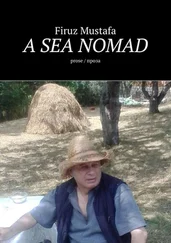***
Today the courtyard was occupied by camels because the leaders of the tribes had arrived with escorts of fierce fighting men. Ali told her that the leaders were to meet the men from the grey ship in the majlis.
The little boat had reached the shore and was being held steady by sailors whilst white men, showing their big pink knees, which fascinated Nahla, were climbing out onto the sand. One carrying a white tube started approaching and waving to her. She covered her head and ignored him, because Ali had told her never to look into the eyes of a strange man, for he will interpret this as complicity. Nahla turned from the man and ran to Ali, where she punched his fat belly until he opened his eyes.
“What is wrong my child?” he asked.
“The men are coming from the grey ship, Ali, and one looked at me for complicity,” said Nahla nervously, not knowing what the word implied.
“They will not harm you. Come, we will announce them at the fort,” said Ali as he stood up, stretching away the last vestiges of his siesta, and brushed sand from his robe, where it adhered to his perspiration. The pair hurried ahead of the white men, towards the Indians who had their sheep cooking and were standing back from the heat of the fire, wiping their brows. They were ready with shovels to cover the carcasses once they were hot enough.
“That’s for the visitors to eat,” said Ali, as they passed the pit from which they could smell smoke and burning flesh. Ali shouted through a little hatch to the gatekeeper; “The foreigners have arrived.” The old man, who was almost blind, strained and groaned as he lifted his arthritic bones from the cot where he spent his days and nights. He pulled back the great iron-studded wooden door, survivor of centuries of abuse, and wedged it open with a piece of driftwood.
A hive of activity was revealed inside the fort as the camels, abandoned by their riders, were being hobbled in one corner in front of the harem. Above them, Nahla could see reflections from the eyes of the women glinting as they admired the fighting men through the grilled shutters. Servants were sweeping away dung from the camels, saving it for fires, whilst the men from the tribes were arguing about positions in a line that they were forming – “An honour guard,” Ali said knowledgeably.
By the time the white men had reached the gate the tribesmen were standing in line, belts of bullets across their chests, cherished ancient guns on their shoulders, “facing their front like English soldiers,” Ali whispered. Nahla’s father was standing at the near end of the line facing the gate, looking serious, she thought. She felt proud of him in his coloured turban and crisp white dishdash, fastened with a belt decorated with silver braid beneath his open black cloak, edged with gold thread. One hand rested on the silver covered horn handle of his khanjar, tucked into the front of his belt, and the other held a silver-tipped camel cane. She caught his eye, but as usual he appeared to be ignoring her, just as he ignored Ali.
Though outwardly Salim ignored them, they were both in his thoughts: How it gratified him to see Ali as he was today and not as he had been seven years earlier, when he had stolen the love of his favourite woman. Salim alone suspected that Ali had fathered Nahla, for he had himself suffered impotency from before the girl’s conception. Now he was no more to a woman than the eunuch. Was this, as with her death at childbirth, his punishment from Allah for not saving the slave from his brothers? His thoughts were diverted as he became aware of the white men. “How undignified they look with their legs exposed. Why did no one tell them how to present themselves decently attired? I can accept this eccentricity, but hope the other guests do not take offence,” he thought.
One by one the eyes of the tribesmen wavered from looking straight ahead and each managed to glimpse the bare pink knees. Some felt insulted, some an erotic sensation, and others were amused, but all resolved to not comment out of respect for their Emir. At the gate two of the white men held back to allow one, who had the decency to wear long trousers and a pith helmet, and who was their spokesman, to reach the front of their party. The man in front removed the helmet and clasped it to his chest. The other two followed his example by removing their white officer’s caps.
As they came close to Salim the spokesman raised his right hand in a salute and Salim responded with the greeting, “Salaam alaikum.”
“Wa alaikum asalaam,” replied the one in trousers who, Salim was relieved to learn, could at least speak some Arabic. He knew it would offend the leaders if he used English to address the foreigners. The thought of speaking English reminded Salim of his return from England at the start of the War in Europe, when he had been filled with enthusiasm to follow the example of the European democracies and liberate his people from the backward feudal existence dictated by men who interpreted the words and writings of The Holy Prophet on behalf of those who embraced Islam. He would at least have caused his subjects to follow the example of the Turkish secular Muslim state, but whilst war persisted he could make no progress, and during this time his energy and enthusiasm waned, the country was driven by poverty further into the extreme Islamic camp, and he feared the task was now beyond him, unless the news that would be announced today altered the balance in favour of progress. His attention returned to the spokesman, who was introducing himself and his companions in Arabic. Salim, also in Arabic, invited the white men to inspect the guard. The spokesman, who was a representative of the British Colonial Office and named Farnham, translated for the Naval Officers. Clean shaven and with curled red hair, James Farnham would have felt more comfortable in the kilt of his native Scotland than in khaki flannels in the climate of the Gulf. With his two bearded Naval companions and the bearded Arabs, he felt completely out of place. All three visitors walked slowly past the row of armed men with Salim who, when they reached the end of the line, invited them to enter the majlis where the tribal leaders were waiting.
Chapter 8
They followed the example set by the pile of sandals at the entrance and abandoned their shoes. The English and Scots men found themselves in a scented, dark, and noisy room, around the walls of which ornate cushions had been arranged. Here sat the bare-footed leaders of the other influential tribes of the Emirate, who had all heard rumours about oil being discovered in their country and were expecting confirmation during this meeting.
As the eyes of the white men grew accustomed to the lack of direct sunlight, they saw that all were dressed like Salim. Farnham thought their beards made them look older and wiser than their years. He knew them to be simple men whose lives were ruled by Islamic tradition and, by his standards, a misplaced sense of family honour. At one end of the room was an empty seat, obviously the Emir’s, he thought. At the opposite end was a table, hardly visible through the haze of burning frankincense rising from clay burners scattered about the floor. At the table two Indians in smart European dress were sitting, scribes, he decided. The beards stopped wagging as each of the leaders became aware of the stocking footed visitors.
The Arabs stood, then shuffled away from Salim’s seat to make three spaces. Salim directed the visitors to one end of the incomplete circle that they had formed, where the first hand was offered. The visitors nervously shook it and received an enthusiastic but unrecognised greeting. Later, Farnham explained that they were asking after the state of their livestock and of the health of their relatives. The sailors mumbled “zain” in response, at what they thought might be appropriate breaks in the exchange, as Farnham had briefed them to do. His own response was more extensive, with greetings in Arabic, making appropriate enquiries of the Arabs and punctuating them with “alhamdulillah.” They moved to the next hand until all present had been likewise introduced by Salim. Salim then indicated for them to sit, before taking his seat. Farnham diplomatically ensured that the officers sat adjacent to Salim in order of seniority, with himself furthest away, indicating to the Arabs the sailor’s seniority to himself.
Читать дальше












